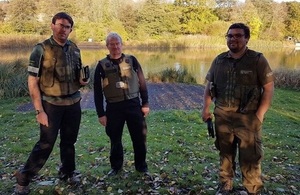Environment Agency tests new powers for volunteer bailiffs
The Environment Agency and Angling Trust are running a pilot project to support fisheries enforcement officers.

The Environment Agency and Angling Trust are running a pilot project, funded by the fishing licence, testing the benefits of giving members of Voluntary Bailiff Service powers to make fishing licence and byelaw checks. If successful, the initiative’s expansion would allow Environment Agency fisheries officers to focus on investigations into other types of fisheries crime.
In the first phase of the project, the Angling Trust recruited over 300 volunteers across England to help Environment Agency fisheries officers by providing information and reporting suspicious incidents on riverbanks and lakes.
In the second phase, the pilot project has now trained 10 of the Voluntary Bailiff Service members from the south east to undertake fishing licence and byelaw compliance checking patrols, reporting offenders in the same way that Environment Agency enforcement officers do.
Judy Proctor, head of fisheries at the Environment Agency said:
The volunteer bailiffs already provide a great service to angling by helping our officers catch people fishing illegally. We will be evaluating the pilot carefully to see what more can be done and how we can improve the service.
There is no excuse for illegal fishing. A fishing licence costs from just £30 for a whole year and you can get one on GOV.UK. Anyone fishing illegally can expect to be prosecuted and face a fine of up to £2,500 and up to £50,000 for byelaw offences. In 2015/16, the Environment Agency’s patrols checked 62,076 rod licences and brought 2,043 successful prosecutions for fisheries crime.
The Voluntary Bailiff Service recently inducted a further 35 new Phase 1 recruits in the North East and is currently recruiting in the rest of England. Induction and training days are being held this spring and anyone expressing an interest in joining the VBS should email karen.sarkar@anglingtrust.net